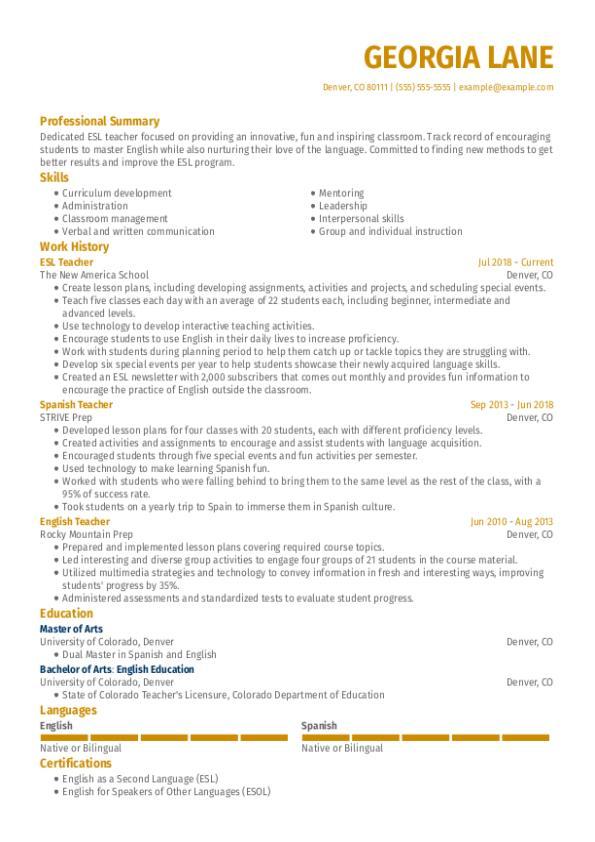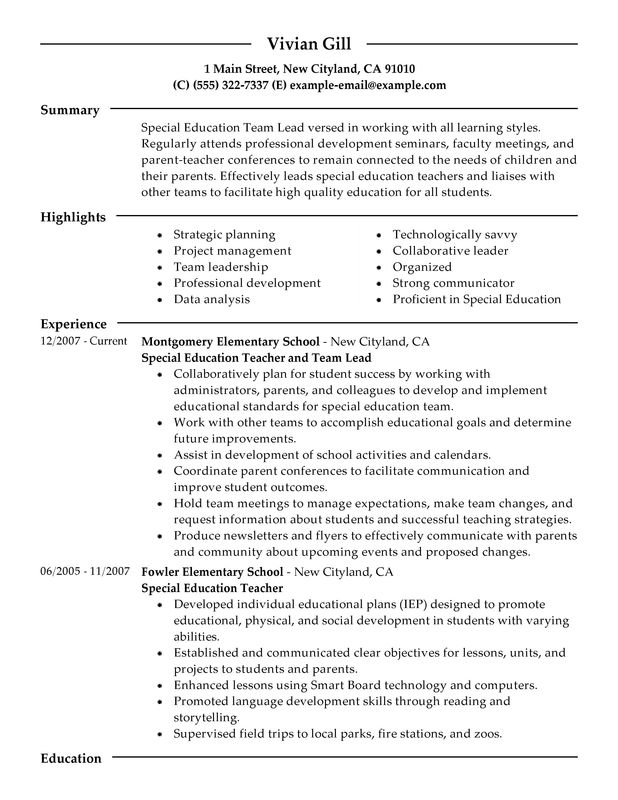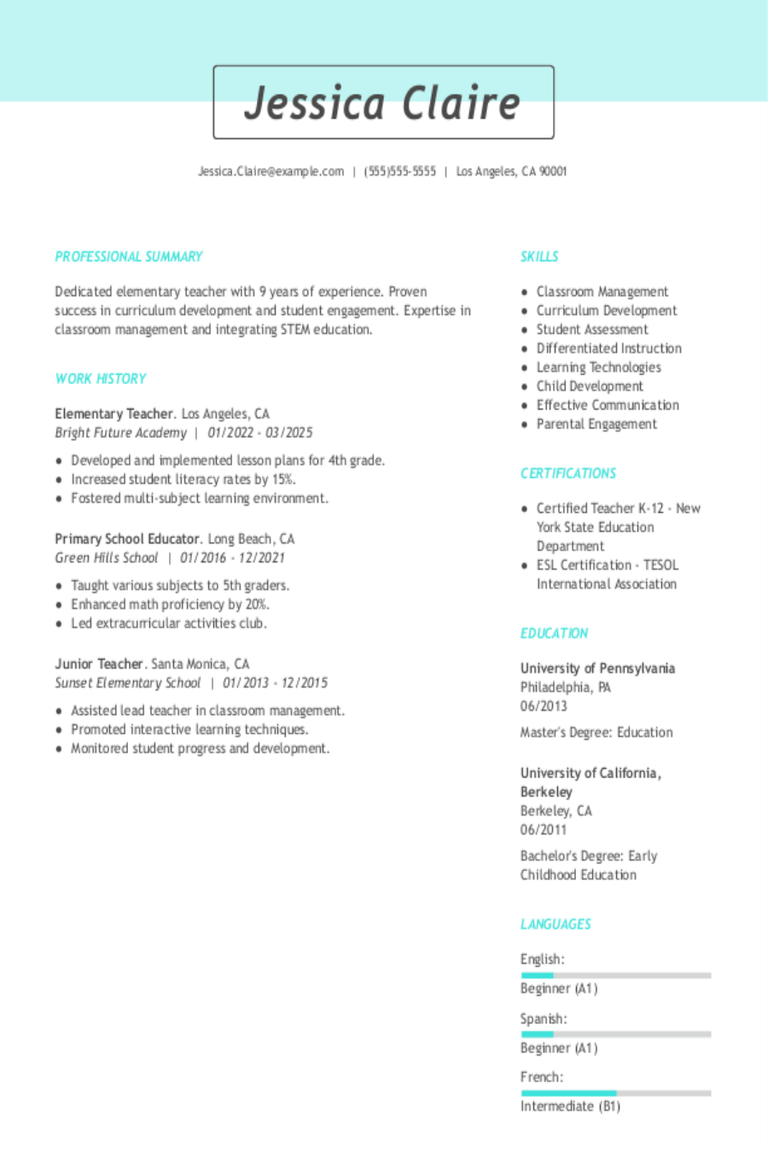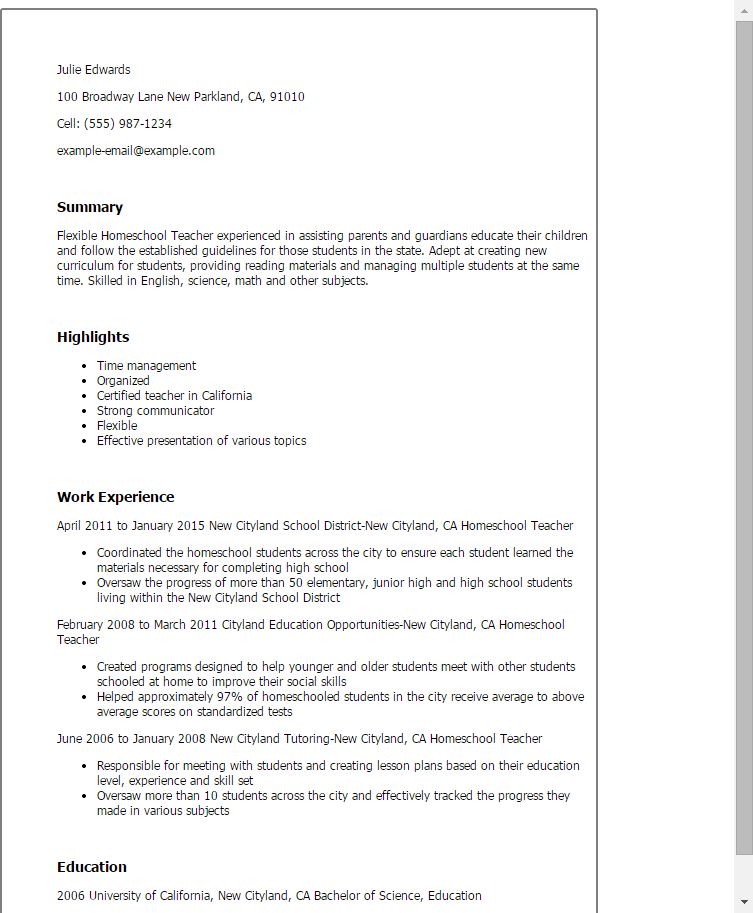Why this resume works
- Quantifies accomplishments: The resume quantifies accomplishments through specific metrics, such as a 20% annual increase in student reading scores and a 15% increase in class participation, demonstrating tangible impact.
- Showcases career progression: Showcases career progression by detailing advancement from literature educator to English teacher, indicating increased responsibilities and recognition over time.
- Uses action-oriented language: Action verbs like “enhanced,” “created,” and “led” clearly convey the job seeker’s proactive efforts in improving student performance and participation.
More English Teacher Resume Examples
Explore our English teacher resume examples to effectively showcase your teaching expertise, communication skills, and classroom management. These teaching resume samples will help you craft a compelling resume that highlights your essential qualifications and experience.
Entry-Level English Teacher
Why this resume works
- Features a strong education section: The clear presentation of advanced degrees effectively in the education section underscores the academic credentials that are essential for those early in their teaching career.
- Touches on accomplishments: Accomplishments such as leading the school to a regional debate competition showcase impressive performance and contributions within educational settings.
- Shows digital literacy: Proficiency in educational technology is highlighted, showcasing strong computer skills and readiness for modern digital tools essential in contemporary classroom environments.
Mid-Level English Teacher
Why this resume works
- Includes a mix of soft and hard skills: Presents a well-rounded skill set, blending technical curriculum development and student assessment with interpersonal skills like organizing parent-teacher meetings and coaching extracurricular activities.
- Demonstrates language abilities: Language skills are evident through listed proficiencies in English, Spanish, and French, underscoring capabilities in cross-cultural communication and potential for international educational settings.
- Displays technical expertise: Technical expertise is highlighted by certifications such as TESOL and IELTS Trainer, along with specialized technical skills in educational technology, lesson planning, and project-based learning.
Experienced English Teacher
Why this resume works
- Focuses on work history: Showcases work history using a chronological resume format to emphasize extensive experience and progression in the teaching field over the years.
- Showcases impressive accomplishments: Highlighting significant accomplishments like enhancing student performance by 20% and achieving a 98% pass rate, the resume underscores a high-impact career with senior-level achievements.
- Emphasizes leadership skills: Examples such as leading AP literature classes and organizing large-scale writing workshops illustrate strong leadership skills throughout various roles.
English Teacher Resume Template (Text Version)
Yuki Brown
Greenfield, IN 46149
(555)555-5555
Yuki.Brown@example.com
Professional Summary
Dynamic English Teacher with over 4 years of experience. Proven success in boosting student performance, fostering engaging learning environments, and utilizing technology for effective education.
Work History
English Teacher
BrightStar Academy – Greenfield, IN
March 2023 – March 2025
- Enhanced student reading scores by 20% annually
- Created engaging lesson plans increasing class participation by 15%
- Led extracurricular activities fostering a 25% increase in attendance
Language Arts Instructor
Horizon Middle School – Greenfield, IN
March 2021 – February 2023
- Improved writing skills in 50+ students through tailored workshops
- Integrated technology increasing interactive learning by 30%
- Coached debate team winning 3 city-wide competitions
Literature Educator
Maple Leaf High School – Greenfield, IN
March 2019 – February 2021
- Implemented curriculum enhancing student pass rates by 10%
- Organized literature clubs growing membership by 40%
- Mentored students achieving top 5% in state exams
Skills
- Curriculum Development
- Student Assessment
- Lesson Planning
- Classroom Management
- Student Engagement
- Project-Based Learning
- Educational Technology
- Public Speaking
Education
Master of Arts English Literature
Harvard University Cambridge, MA
May 2018
Bachelor of Arts English
University of California, Berkeley Berkeley, CA
May 2016
Certifications
- TESOL Certification – International TESOL Association
- Advanced Teaching Certificate – National Board for Professional Teaching Standards
Languages
- English – Beginner (A1)
- Spanish – Beginner (A1)
- French – Beginner (A1)
Popular Skills for a English Teacher Resume
A well-crafted resume skills section is crucial for highlighting the essential abilities required to excel as an English teacher. It should feature both hard skills, like lesson planning and grammar expertise, along with soft skills, such as patience and communication.
Below are a few of the top soft skills frequently listed on English teacher resumes.
| Soft Skills | % of resumes with this skill |
|---|---|
| Classroom management | 48.21% |
| Problem-solving skills | 46.67% |
| Student motivation | 46.67% |
| Team collaboration | 25.45% |
| Parent communication | 18.75% |
Here are a few examples of hard skills frequently included on English teacher resumes.
| Hard Skills | % of resumes with this skill |
|---|---|
| Student-centered learning | 31.25% |
| Group and individual instruction | 18.75% |
| Lesson planning | 17.86% |
| Creative and expository writing | 13.33% |
| Technology integration | 12.50% |
Related Resume Guides
- Driving Instructor
- Early Childhood Assistant
- Early Childhood Teacher
- Elementary Teacher
- ESL Teacher
- Foreign Language Teacher
- Fresher Teacher
- Graduate Assistant
- High School Social Studies Teacher
- High School Teacher
- Homeschool Teacher
- Language Professor
- Master French Teacher
- Middle School Teacher
- Nurse Educator
- Physics Professor
- Piano Teacher
- Preschool Teacher
- Public Health Advisor
- Retired Teacher
- Spanish Teacher
- Student Teacher
- Summer Teacher
- Teacher
- Teaching Assistant
- Tutor
- University Professor
Advice for Writing Your English Teacher Resume
Explore our tailored advice on how to write a resume and discover how to highlight your teaching experience, language skills, and passion for education.
Highlight relevant certifications and training
Certifications and specialized training are essential for English teachers, showcasing their expertise and dedication to education. These qualifications ensure that educators can manage diverse classroom environments, utilize effective teaching methods, and enhance student learning.
Create a certifications section on your resume after the education section or skills section for better visibility. Include certifications such as:
- National Board Certification (NBPTS), TESOL/TEFL Certification
- Child Development Associate (CDA) Credential
- Google Certified Educator
- Special Education Certification
- Reading Specialist Certification
- STEM Teaching Certification
- Educational Leadership Certification
Detail the certification name, issuing organization, and date obtained or expiration date. Emphasize any specialized training in research methodologies or software skills for teaching English.
By clearly outlining your certifications and training, you demonstrate to potential employers that you possess the necessary qualifications and commitment to thrive as an English teacher.
Example of a certifications & training section
TESOL Certification
Issued by: University of Toronto
Completed 2020
Cambridge English Level 5 Certificate in Teaching English to Speakers of Other Languages (CELTA)
Issued by: Cambridge Assessment English
Completed 2019
Advanced Professional Certificate for Teachers of English (APCTE)
Issued by: Bridge Education Group
Completed 2021
ESL Endorsement
Issued by: State Department of Education
Expires 2024
Advanced Grammar for Teachers Workshop
Issued by: Oxford University Press
Completed 2022
Check out our professional resume examples for inspiration and guidance to help you create a resume that stands out to recruiters and hiring managers.
List your most relevant skills
It’s important for an English teacher to include both technical and soft skills on their resume. Technical skills include proficiency with educational software like Google Classroom, Zoom, or Microsoft Teams. These tools help in planning lessons, grading assignments, and communicating with students and parents.
Soft skills are just as crucial for an English teacher. Strong communication skills are needed to explain concepts clearly and effectively. Patience and empathy help in dealing with different student needs and learning paces. Organizational skills ensure that lesson plans are well-structured and time is managed efficiently.
When listing your skills, create a dedicated Skills section on your resume. Include categories like “Technical Skills” and “Soft Skills” to make it easy for employers to see your strengths at a glance.
Also, weave these skills into your work experience bullet points. This shows how you apply these skills in real-life scenarios.
For example: “Implemented interactive reading sessions using Google Classroom” or “Developed a supportive classroom atmosphere through effective communication.”
Incorporate keywords from the job listing into your resume to increase your visibility with applicant tracking systems (ATS) and stand out to recruiters.
Write a strong professional summary
A professional summary offers a quick glimpse of your background and abilities, creating the initial impression an employer has from your resume.
For seasoned English teachers, this section should emphasize years of teaching experience, areas of expertise such as curriculum development or student engagement, and notable achievements like improved test scores or successful literacy initiatives.
If you’re just starting out with limited experience, opt for a resume objective to highlight your enthusiasm for teaching, relevant coursework or certifications, and educational goals.
Both approaches benefit from action-oriented language that underscores your impact — terms like “developed,” “enhanced,” and “facilitated” can make your achievements stand out.
Ensure it’s brief and tailored to the English teacher role by focusing on essential skills such as lesson planning, classroom management, and effective communication.
English teacher resume summary examples
Entry-level
Enthusiastic and dedicated recent graduate with a Bachelor’s degree in English Education from Temple University. Equipped with teaching certification and hands-on experience through student teaching assignments. Proficient in creating engaging lesson plans, assessing student progress, and utilizing technology to enhance learning. Passionate about fostering a love for literature and helping students develop strong communication skills.
Mid-career
Experienced English teacher with over 5 years of expertise in secondary education, adept at developing comprehensive curriculums that meet state standards. Proven track record of improving student literacy rates and enhancing classroom engagement through innovative teaching methods. Holds a Master’s degree in English Literature and certified in ESL instruction. Committed to nurturing critical thinking and effective communication among students.
Experienced
Highly accomplished English teacher with 15+ years of experience across diverse educational settings, including public schools and private institutions. Renowned for leadership roles such as head of the English department, mentoring junior teachers, and leading curriculum development initiatives. Specialized in AP English language and composition instruction with a history of significant improvements in student exam scores. Dedicated to advancing educational excellence through strategic planning, continuous professional development, and a passion for lifelong learning.
English teacher resume objective examples
Recent graduate
Recent English graduate with a strong passion for education and literature seeking an entry-level English Teacher position. Dedicated to fostering a positive learning environment, enhancing student engagement, and promoting critical thinking skills through innovative teaching methods.
Career changer
Motivated professional transitioning from corporate communications to education, aspiring to leverage excellent communication skills and a solid foundation in English language and literature as an English teacher. Committed to inspiring students and contributing to their academic success with a focus on creativity and interactive learning.
Specialized training
Certified TESOL instructor with hands-on experience tutoring diverse student groups seeking an entry-level English teacher role. Eager to apply specialized training in ESL methodologies to support non-native speakers in achieving language proficiency and academic excellence.
Create a standout resume with our Resume Builder, which offers easy-to-use templates that highlight your teaching skills effectively.
Showcase your accomplishments and publications
Including publications, conference presentations, and research achievements can make your resume stand out as an English teacher. This section highlights your commitment to advancing in your field and contributing valuable knowledge. It also shows that you are active in the academic community and stay updated with current research.
To create a publications section, list peer-reviewed articles, book chapters, and conference papers using a structured format like APA or MLA for citation details such as the journal name, volume, issue, and year.
For example: “Smith, J. (2020). The Impact of Modern Literature on High School Curriculum. Journal of Education, 15(3), 45-67.”
Highlight any major awards, grants, or fellowships you have received to support your research credibility. If applicable, add links to your online research profiles on platforms like Google Scholar or ResearchGate for easy access to your work.
Including these details will help potential employers see the depth of your expertise and your dedication to teaching English effectively through evidence-based methods.
Example of publications section
Peer-Reviewed Journal Articles
- Johnson, M., & Brown, L. (2021). Innovations in teaching English as a second language: A comprehensive review. Journal of Language Teaching and Research, 12(4), 678-690.
- Smith, R., & Johnson, M. (2020). The role of technology in modern English language education. Educational Technology & Society, 23(2), 89-105.
Books and Book Chapters
- Johnson, M. (2019). Advanced Techniques for ESL Educators. New York, NY: Academic Press.
- Taylor, S., & Johnson, M. (2018). Blended learning strategies in the ESL classroom. In P. Green (Ed.), Innovations in Education (pp. 45-67). Chicago, IL: University Press.
Select a straightforward and professional resume template with well-defined sections. Steer clear of elaborate fonts and excessive design details to ensure your skills and experience are highlighted.
FAQ
Do I need to include a cover letter with my English teacher resume?
Including a cover letter with your English teacher resume is a smart way to stand out. It allows you to introduce yourself, share why you’re passionate about teaching, and highlight specific strengths, such as designing engaging lesson plans or managing a dynamic classroom.
A well-crafted cover letter also lets you show genuine interest in the school or district and connect your approach to their educational values. It’s the perfect place to mention unique experiences, such as leading a writing club or using tech to enhance learning.
Tailoring each letter to the job description can make a big difference in catching a hiring committee’s attention. Try our Cover Letter Generator or explore professionally crafted cover letter examples for inspiration.
How long should a English teacher’s resume be?
The ideal resume length for an English teacher resume is between one and two pages.
Early career educators should aim for a one-page resume that features their education, certifications, and relevant experiences such as student teaching or tutoring.
Focus on recent and significant achievements while emphasizing skills in curriculum development, classroom management, and student engagement.
For those with more experience, a two-page resume can effectively highlight additional roles, advanced degrees, publications, or special projects.
How do you write a English teacher resume with no experience?
When crafting a resume with no experience for an English teacher role, highlight your education, relevant skills, and any experiences that showcase your teaching potential. Here are a few tips to help you get started:
- List your educational background: Include your degree in English or education, the university name, and graduation date. Don’t forget to mention any teaching certifications or ongoing certification programs prominently.
- Showcase internships and volunteer roles: Detail any student teaching jobs, tutoring sessions, or volunteer work where you taught English. Explain your responsibilities and the positive results you achieved.
- Highlight transferable abilities: Emphasize skills like communication, creativity, lesson planning, and classroom management. If you’ve developed these skills in other roles (e.g., camp counselor or mentor), include those experiences as well.
- Mention relevant coursework: Cite specific courses directly related to teaching English to demonstrate your academic preparedness for the position.
Start your resume with a brief introduction that highlights your passion for teaching and dedication to student success.
Rate this article
English Teacher
Additional Resources

ESL Teacher Resume Examples & Templates
Want a job as an English as a second language (ESL) teacher? Then you need a great ESL teacher resume. We’re here to help. Use our guide to create a

Special Education Teacher Resume Examples & Templates
Resumes are crucial tools for job seekers, serving as the first impression for potential employers. A well-crafted resume, especially for special education teachers, can showcase your dedication and expertise in

10 Resume Tips for New Teachers From Experienced Teachers
Creating a perfect, career-launching resume is no easy task. Following general resume writing rules can help, but it is also smart to get advice tailored to your specific job search. When you’re

Elementary Teacher Resume Examples: Pro Guide + Tips
Explore elementary teacher resume examples designed to help you highlight your teaching credentials, classroom management techniques, and student engagement strategies.Build my resumeImport existing resumeCustomize this templateWhy this resume worksQuantifies accomplishments: The

Homeschool Teacher Resume Examples & Templates
Homeschooling is on the rise throughout the United States with many parents making the choice to educate their children at home instead of in a traditional school classroom. However, a

Teacher Cover Letter Examples & Templates
Teachers play a vital role in educating and shaping future generations. They work in a variety of settings, including public and private schools, colleges and universities and community organizations. Teachers
